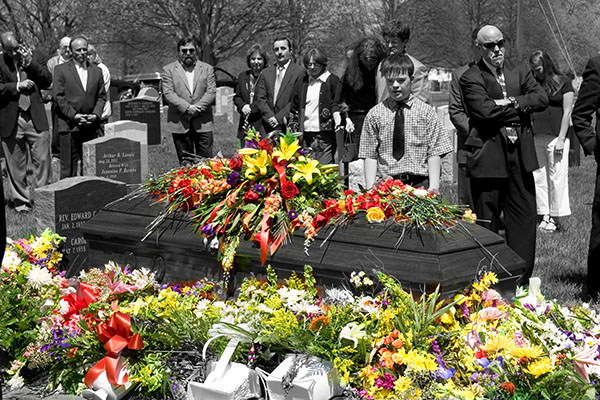The Value of Funerals

The sudden death of Coach O on Tuesday has made me think not only about what he meant to me but of the entire grieving process.
First of all, Peter O'Sullivan was one of the few people -- never mind teachers -- I respected greatly during high school. As my track and cross country coach for four years and Sophomore Geometry teacher, I got to know him as a humble man of integrity. Like many of my track-mates, there were times when I hated doing the workouts that Coach O would subject us to, but any rational person (even a high school kid) would not confuse the coach for the workout. He had the sensitivity to know each of our limits even if we didn't. He knew whether our complaints of "Not another 800!" were due to laziness or actual fatigue. His years of experience gave him the maturity not to look down on his runners or put us through agony for no good reason. I should hope that anyone who looks back on their track career under Coach O would recognize his inate fairness.
I was a weird kid back then. There were times when I'd run in my underwear or carry around junk that I found on the streets of Lawrence while running. Once, I realized that I forgot to pack my shoes, but rather than borrow somebody else's, I ran in my socks that day. After the warm-up run to the cemetary wore holes in my socks, I proceeded to run some of the fastest half-mile repeats I'd ever accomplished. But when Coach O noticed that my feet were bleeding, he told me to head back to school. The memorable part, however, was that he never judged or treated me with less dignity. You'd have to do something terrible to lose Coach O's respect.
As a Senior, when I practically begged him to let me run in a varsity indoor track meet, he let me run the 1000 against Tewksbury. I remember I did horribly, and we lost the meet (though not soley because of me!). I felt like I let both myself and Coach O down, but I don't think he saw it that way at all. And that's what made him special.
After graduating, I visited Central a few times and always went to see the "Silver Fox". Even though we never seemed to have time to talk about much, I felt that had some kind of understanding -- I don't know how to pin it down. Once, I stopped in and sat in his class while he gave his students a quiz. He didn't tell me to leave or think it strange that I'd be there; he was glad to see me. We talked while his kids racked their brains in geometric frustration.
I guess I regret not being able to know Mr. O'Sullivan as Pete. As a friend. Because from the time that I knew him and talked with him, I'm sure he was a great friend to many people. And after his wake and funeral revealed a bit of the other side of Pete -- the consumate family man and caring friend -- I feel even sadder that the community lost Coach O so suddenly.
All of that brings me to my second point:
The Grieving Process
As a fairly secular person, it's easy to dismiss funerals and wakes as pointless ceremonies, but I think I'm a little more open-minded now. One important result Coach O's funeral was that it brought together hundreds of people who cared enough about the man to show their support for his family. It's a powerful point to make. Even if his family and friends knew he was a great guy, I'm sure they were heartened to see all of these strangers -- students, alumni, teachers, students' relatives -- there to offer condolences. Just the overwhelming presence might help his loved ones feel a little better about the loss. But I don't know.
Another point is that I think it doesn't really matter what happens during a funeral or wake ceremony. I think it comes down to the power of the human mind. The ceremony is our way of telling ourselves, "Yes, if we go through these motions and say these things, we'll be at least slightly less depressed afterwards." And it works, I think. Of course, the loss of a loved one cannot be forgotten after a few incantations and songs, but I think the ceremonies (no matter what they entail) can help relieve the initial pain of losing that person forever. As long as the participants agree that the ceremony will work, it will work. Whether it involves standing and kneeling at certain times in a church, or an old fashioned open-bar Irish wake, or sitting down together to tell jokes about the person who just died, the shared experience and mutual agreement to help eachother through grief are the key ingredients that make such ceremonies effective.
If funerals are a means of dealing with profound suffering, then who am I to say they're pointless?